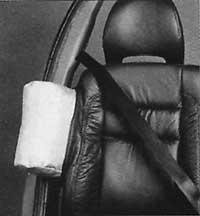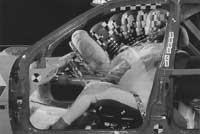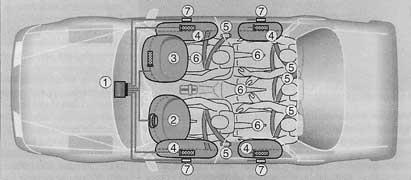New car airbags

Within a few years in cars airbags or inflatable bags will be distributed inside and a computer will instantly calculate which airbags should blow and how and how much should swell considering the morphology of each passenger. It will be possible for parents, children and children to get healthy after an accident in the car.
Motorists have been designing smart bags or inflatable bags for years. It is estimated that the first will be published around 2000. But how will such satisfying results be achieved in accidents? To do this, the system must detect the first thing to be protected. Decide whether the seats are full or not first and whether the seated person is an older person, young or with arms. This implies intelligent answers.
Traveler detection
The first step, as we have said, will detect whether the seat is empty or full. This is an important point, since the seat airbag next to the driver in case of an accident in current vehicles, always swells even if there are no passengers, and the material damage it produces is not negligible. The Netherlands and Germany therefore threaten that insurers do not pay the material damage caused by the second airbag.

To inflate the bag only when needed, it is best to detect if there are passengers or not. A system for this is to place a few skid steers in the vehicle seat. When the passenger sits down, the person presses a small dynamometer similar to weighing devices. In short this dynamometer will measure the weight of the sitting person and will be able to know if it is greater or less.
Another way to know if the seat next to the driver is empty is to manually operate a switch. This system is already used in the United States, but within two years the system will be able to distinguish whether the person is older or whether the child is in his special seat. Special child seats will have an electromagnetic card to send the signal and the computer will neutralize the corresponding airbag. The system will know the presence of adults through voltage variation sensors in seats. When the weight of the passenger exceeds 15 kilos, the signal is sent to the central unit.
These procedures, developed by the AMP companies of Bosch, Siemens and North America, have a clear limitation: they do not take into account the morphology of the passenger or his behavior in the vehicle, that is, they do not have “intelligence”.
Smart system
It is not enough to inflate the bag in case of accident. And you have to inflate differently than you are sitting depending on whether you are young, older person, woman or large body. For this purpose it will have captors in dashboard, seats, central pillars and doors. They will detect the type of traveler and their position within the vehicle at any time. Then the central unit will determine the inflating bags and the amount of gases that are inserted into each bag. Different methods are being studied to achieve this. Some are based on infrared rays, others on ultrasound, high frequencies, etc. In the end we do not know what kind of system will prevail, but certainly smart systems will be implemented.

Side airbags
In the cars the front airbags for the driver and the passenger appeared first, but the sides have also begun to be placed. They are smaller than them (about 15 liters), but they inflate very quickly. Keep in mind that the front bags are filled in 50 milliseconds and the sides in 20 milliseconds. The side airbags are located at the door or on the edge of the seat back. The current side airbags protect the entire chest of the body, but soon there will also appear those that protect the head.
BMV and Autoliv prefer to place two different airbags in one car, but others like Allied Signal, TRW and Delphi prefer to use a single airbag type of about 25 liters.
The side airbags will begin to be installed for all travelers (front and rear) in the next millennium, but the Korean Kía House will build the knee airbags next year. The airbags will also be placed on the back of the front seats to protect the occupants from the rear seats.
Buletina
Bidali zure helbide elektronikoa eta jaso asteroko buletina zure sarrera-ontzian











